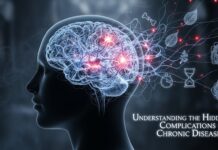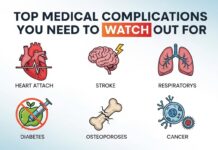Introduction
High blood pressure — you may have no idea if you have it. Yet it takes its toll upon you internally. The area that’s being most badly affected is your kidneys. Uncontrolled pressure causes strain on the blood vessels. This causes insidious and unpalpable injury.
In this guide, we’ll see what elevated risk of kidney damage comes with high blood pressure. Within, you’ll find out how it starts, why it gets worse, and what can be done to prevent it. The goal is straightforward: help you save your kidneys and live healthier.
Staying healthy starts with awareness. Learn about lifestyle changes to prevent Alzheimer’s disease, the first symptoms of Parkinson’s disease, and the early signs of thyroid cancer in women to catch problems early.
How Kidneys Function And Why They are Essential
Your kidneys cleanse your blood every second. Kidneys eliminate waste, regulate fluid levels, and regulate minerals. And they also produce hormones that help control blood pressure itself.
When pressure increases, small filters in the kidney become stressed. Over time, these filters scar. Once scarred, they cannot be fixed. This is a vicious cycle causing an increase in the blood pressure and further deterioration of the kidney functions.
Blood Pressure and Kidney Damage: How Are They Related?
Doctors refer to this problem as hypertensive nephropathy. It develops slowly. The early stages are painless. That is why it is important to have testing done regularly.
Hypertension increases the thickness of the artery walls. To decrease the volume of rib blood flow, vessels constrict. Less oxygen and nutrients then go to the kidneys. As a result, toxins build up. Eventually, renal failure may develop.
Signs You May Be at Risk
Most people disregard early warning signs. You may notice:
- Urine could be frequent, particularly during the night
- Swelling in ankles or face
- Persistent fatigue
- frozen urine foam from protein leakage
- Your high blood pressure becomes more difficult to treat.
These indications involve a need for medical attention. The test results on your blood and urine confirm the harm long before the total failure arrives.
Tree of Life: Complications Other Than Kidneys
Even though kidneys are a key component of hypertension, they’re not the only thing the high blood pressure can impact. It causes a chain reaction throughout your body. Not to mention its harsh effect on blood vessels impairs all other organs.
- Sleep apnea caused by heart disease: Due to poor circulation, heart works harder. Obstructed vessels make you more prone to heart attacks. In turn, sleep apnea exacerbates blood pressure control, so it’s a vicious cycle.
- Vision loss in diabetes: The combination of hypertension and diabetes causes blood vessels in the eye to rupture more easily. The result is a slow loss of sight.
- Nerve damage: When chemotherapy includes drugs to treat hypertension, it is more serious that it is in people without hypertension. If you receive cancer treatment, nerves also have a decreased ability to recover.
- Cirrhotic liver complications: Increased pressure on the veins carrying blood to the liver aggravates the outcome in cirrhosis. Increased stagnation and decreased elimination of toxins.
- Complications of lupus in pregnancy: Pregnant women with lupus suffer increased risks. High blood pressure during pregnancy creates increased risk for mother and child.
- Stroke type AF – Lowering stroke: Irregular heartbeat combined with high blood pressure drastically increases the risk of stroke. The blood vessels of the brain are not able to cope with a sudden increase in pressure.
However, each of these diseases leads back to the damage of a vessel. Kidneys are just part of a far larger puzzle.
Why Uncontrolled Pressure is More Interesting Faster:
One question which one would have is why a person’s kidney rate of decline accelerates after the increase in blood pressure. This is because of the structure of vessel tissue.
Arteries expand with every heartbeat. Wall stiffness due to permanently high force. Once they are stiff, they are lost the ability to expand. What occurs is that the blood pressure increases further. The kidneys are then left with abnormal flow, damaged filters even further.
Another factor is sensitivity to salt. Sodium is not very well excreted in kidney failure. The extra salt causes fluid retention, which in turn causes the pressure to go even higher. This closed loop accounts for why quite uncontrolled hypertension speeds the damage.
Real-World Case Example
A transitional edema occurred in a similar patient, a 52-year-old man with untreated hypertension. He ignored it for months. Later, alkaline and urine dipstick results were abnormal with positive protein on dipstick. Within three years, his kidney function was reduced by half. Doctors immediately kicked off the dialysis.
This is a reflection of a reality most of us are familiar with. This means that most people find out that they have kidney disease only in later stages. It is believed that early diagnosis could have stopped progress.
Medical Insights and Data
According to the National Kidney Foundation, chronic kidney disease develops in almost 1 in 3 adults with high blood pressure. U.S. Centers for Disease Control (CDC): Uncontrolled blood pressure has been estimated to be the second most common cause of kidney failure following diabetes.
Treating to systolic control of less than 130 mmHg can reduce the rate of decline of renal function by up to 30%. These RRR’s conclusively confirm that early action is significant.

Practical Tip for Daily Life
Home monitoring is one of the easiest means of protection. Measuring your pressure at the same time every day shows trends. A diary allows your doctor to make a correction in treatment before any further damage has occurred.
Eating less salt, walking for 30 minutes, and having 7-8 hours of sleep are all also beneficial for kidney function. Small habits make for long-term defense.
Managing daily challenges matters too. Tips for coping with type 2 diabetes fatigue and a routine to reduce arthritis knee flare-ups can improve comfort. Also, untreated atrial fibrillation can raise stroke risk, making timely care vital.
Mercy Thomas: More problems with early detection
Here is a quick and dirty comparison of benefits vs challenges:
How Kidney Problems Get Worse
Kidney damage starts small. Symptoms can take years to develop. First, blood vessels narrow. Then filtration slows. Waste builds in the blood. Protein leaks into urine.
Over time, toxins rise higher. Swelling appears. Fatigue becomes daily. Later, blood count drops. Finally, dialysis or transplant is the only option available.
Other Organ Complications
Damage to the kidneys usually does not occur in isolation. Such elevated blood pressure damages other systems. Each link increases the burden of the disease.
Heart and Sleep Connection
Sleep apnea & heart disease are a potent combo. Increased pressure causes the heart to work harder. While you sleep, sleep apnea reduces the amount of oxygen. This spikes blood pressure. These two problems feed into one another. They lose even more protection of the kidneys.
Eyes and Diabetes
eye sight loss in diabetes is increased when hypertension may be present. Cracks in the retinal blood vessels. Blurred sight follows. If left untreated, blindness can result. Eye damage often accompanies kidney failure.
Nerves and Cancer Treatment
Some patients develop neuropathy as a complication of chemotherapy. Pain in the nerve or loss of feeling (numbness) is common. Hypertension is slow to repair the nerves. This reduces quality of life.
Liver Disease Burden
Liver cirrhosis disease is further increased with high blood pressure. Portal hypertension aggravates swelling. Kidneys are then left powerless to regulate fluids. This double load is a reduced load infiltrating.
Autoimmune Risk While Pregnant
Women who develop complications during pregnancy with lupus will require constant supervision. Hypertension in pregnancy predisposes for preeclampsia. Liver and kidneys both come under strain. Unborn children are at risk as well.
Brain and Stroke
Finally, there is the risk of stroke – atrial fibrillation. Irregular heart rhythm causes clots to go to the brain. An increased blood pressure causes the blood vessels in the brain to be weak. Used in combination, they sharply increase the risk for stroke. Kidney damage is intensified when brain damage makes movement difficult.
Why Early Action Matters
Each stage of hypertension causes damage. Small vessel damage is more easily retardative. Once scarring can be caused, reversal is impossible. That is why timing is key. Detecting Disease Early Saves Kidneys and More.
Practical Prevention Steps
Risk reduction can be done via everyday decisions. Doctors suggest three basic practices.
Diet Changes
Cut the salt consumption to less than 5 grams a day. Eat fresh fruits, vegetables, lean protein. Limit red meat and processed food. Drink lots of fluids, if this hasn’t been advised by your doctor.
Physical Activity
Aim for 30 minutes of walking a day. Helpful is light strength training as well. Getting exercise reduces pressure naturally. It also boosts circulation. Kidneys get more oxygen.
Sleep and Stress Control
Sleep 7-8 hours per night. Treat sleep apnea if present. Deal with stress through breathing, yoga or meditation. Less stress means less pressure swings.
Treatments may bring side effects. Be aware of neuropathy from prolonged chemotherapy and explore autoimmune pancreatitis treatment in children to support better care choices.

Medical Treatment and Advice
Lifestyle-This helps but may not be enough. Doctors add medicines if required.
- ACE inhibitors and ARBs decrease filtering through the kidneys.
- Diuretics eliminate excess salt and water.
- Beta-blockers-reduce the heart’s straining.
- Calcium channel blockers open up arteries.
These drugs decrease the risk of kidney damage. Regular review ensures correct dose. Missing pills result in faster decline.
Role of Regular Screening
The first is a blood pressure measurement. Then urine test which shows protein loss. Blood test reveals creatinine level in. Together, they are a revelation of kidney health.
Annual screening is important if you have diabetes, family history or long-term high blood pressure. The detection of minor changes prevents larger issues afterwards.
Emotional and Social Impact
Kidney disease has an effect on mental health as well. Patients tend to be anxious about dialysis. Families are under financial pressure. Work productivity drops. Early prevention means that this burden is lessened.
Case Study Example
A 40-year-old woman whose case addressed some of the most frequent causes of lupus deaths was revealed to have lupus and high blood pressure. Doctors advised strict watching during the time of pregnancy. She cut back on salt, was on medicines and had tests each week. Her baby was born just fine at 36 weeks. Kidneys remained stable.
Awareness and teamwork to save lives, this case is a good example.
Expert Insight
The American Heart Association says people have a 5-10 year longer life span if their blood pressure is controlled rather than uncontrolled. World Health Organization to emphasize reduction of risk of kidney disease by up to 40% through diet and exercise.
Simple Home Strategies
Keep a digital monitor in your home. Write down readings. Share them with your doctor. Drink more water in summer. Limit alcohol. Say no to smoking. These small steps become life-long kidney defense!

Frequently Asked Questions
1. Does high blood pressure actually lead to kidney failure?
Yes. Great high pressure-the constant high pressure scars kidney filters. Once scarred, they can’t recover. This may cause kidney failure over the course of years. Early management avoids this consequence.
2. How quickly does the kidney damage occur with hypertension?
It depends. Some people tend to lose function slowly over decades. Others die within a few years if uncontrolled pressure is not averted. Instead, check yourself daily to see your own personal trend.
3. What diet is best for kidneys?
High salt and balanced diet is useful for most. Fill your plate with fresh vegetables and fruits, lean meats and whole grains. Avoid canned, fried and processed foods.
4. Is long-term use of medicines safe?
Yes. Kidney-protective drugs such as ACE inhibitors are being used around the world. Doctors make changes depending on tests. Stopping suddenly is more dangerous than being on therapy.
5. Can kidney be protected by lifestyle only?
Sometimes, but not usually, especially early. But quite the number of patients need habits and medicine together. Omission of either decreases protection.
6. Is kidney damage reversible?
No. Scar tissue cannot heal. But you can stop further harm. Early diagnosis is the key.
7. Does sleeping trouble affect kidneys?
Yes. Poor sleep raises pressure. Conditions such as sleep apnea make high blood pressure more difficult to control. So treating them helps to protect kidney health.
How Prevention Saves Lives
High blood pressure appears to be silent. Yet it creates a slow brewing storm within your body. One is kidneys and then the heart, brain, and eyes. If we take action today it changes tomorrow.
Simple habits help:
- Eat less salt
- Exercise daily
- Sleep well
- Take medications according to the doctor’s instructions.
- Get regular health checks
These steps seem small. But combined, they reduce risk by half or more.
Final Thoughts
The kidney damage risk high blood pressure generates is real. It begins quietly. It grows slowly. But when one’s kidneys fail, life changes completely. Dialysis and transplant are the only options.
The good news: You are in control. Lifestyle, treatment and awareness delays damage for many years. Doctors and patients collaborating with each other see the best results.
Closing Note
Never ignore your numbers. A blood pressure monitor at home is as important as a thermometer. Each reading gives you power.
Protect your kidneys today. Guard your future health. The present exertion you make will save you years of life and freedom hereafter.









